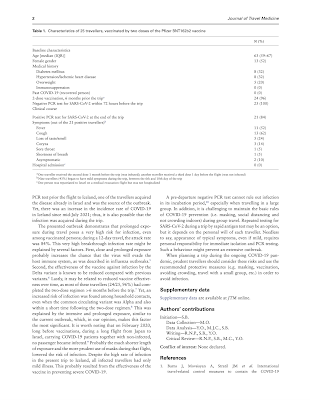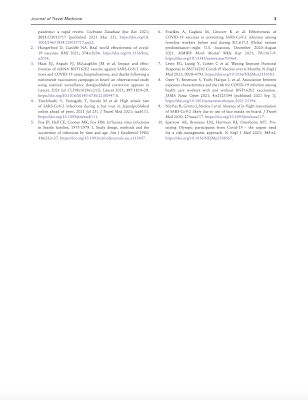A fascinating bit of research from Israel provides us with an analysis of the effectiveness of the COVID-19 vaccines and their ability to prevent transmission of the SARS-CoV-2 virus.
The paper which is entitled "High attack rate of COVID-19 in an organized group of vaccinated travellers to Iceland" is dated September 23, 2021 (acceptance date) and is written by members of the Faculty of Medicine at the Hebrew University of Jerusalem, the Department of Clinical Microbiology and Ifenctious Diseases at the Haddassah Hebrew University Medical Center and Clalit Health Services also located at the Hebrew University in Jerusalem.
The paper opens by noting that, while international travel was halted to control the spread of the SARS-CoV-2 virus throughout 2020, following the global vaccination plans put in place late in 2020, it appeared that vaccinated travellers could be assured of safe, COVID-19-free travel. As such, there was an increase in the number of outgoing Israeli travellers.
On August 3, 2021, approximately two months after the Delta variant caused a fourth wave of infections in Israel, an organized group of 25 Israeli travellers departed from Tel-Aviv for Rejkjavik with a four hour connection in Vienna for a 12 day tour in Iceland. All of the travellers were fully vaccinated with 2 doses of Pfizer's BNT162b2 vaccine (now known as Comirnaty) with one tourist having been vaccinated only a month prior to the trip and all underwent an RT-PCR test within 72 hours of departure for the presence of the SARS-CoV-2 virus which showed that none of the travellers were infected.
Here is a listing of the "reality on the ground" for the tourists while in Iceland:
1.) a fully vaccinated bus driver was used and the entire tour took place on the same bus.
2.) since the weather was cold, the bus windows were closed.
3.) on most days the travellers were on the bus for up to 8 hours at a time.
4.) the travellers were instructed to wear disposable face masks with partial compliance.
5.) the travellers had little indoor contact with locals or other tourists.
Here is some background information on the 25 travellers:
1.) median age - 63 years (range 59 to 67 years)
2.) females - 13 out of 25
3.) medical history - 8 had diabetes, 8 had hypertension/ischemic heart disease, 5 were overweight, none suffered from immunosuppression, none had recovered from a past COVID-19 infection.
On August 13, 2021 (the tenth day of the tour), the Israeli travellers underwent a pre-departure RT-PCR test. Of the 25 travellers, 15 were shown to be SARS-CoV-2 positive which required that they stay in isolation in Reykjavik for ten days prior to returning to Israel. The ten travellers who tested negative in Iceland returned to Israel, however, upon landing, six were found to be positive for the SARS-CoV-2 virus leaving four travellers who were non-infected. Overall, the attack rate for COVID-19 was 84 percent with 21 out of 25 travellers being infected.
Here is a list of the symptoms experienced by the 21 positive travellers:
1.) fever - 11 travellers
2.) cough - 13
3.) loss of taste/smell - 5 travellers
4.) upper respiratory infection - 3
5.) sore throat - 1
6.) shortness of breath - 1
7.) asymptomatic - 2
None of the 19 travellers that tested positive for the SARS-CoV-2 virus required hospitalization and most cases were mild. It is unknown whether the Delta variant was the infecting virus and, given that several travellers were already symptomatic during the trip, it appears that one of the travellers had acquired the disease in Israel and was the source of the outbreak although it is possible that the infection was acquired during the trip.
Here is a concluding quote from the paper:
"The presented outbreak demonstrates that prolonged exposure during travel poses a very high risk for infection, even among vaccinated persons; during a 12-day travel, the attack rate was 84%. This very high breakthrough infection rate might be explained by several factors. First, close and prolonged exposure probably increases the chance that the virus will evade the nost immune system, as was described in influenza outbreaks. A pre-departure negative PCR test cannot rule out infection in its incubation period, especially when travelling in a large group. In addition, it is challenging to maintain the basic rules of COVID-19 prevention (i.e. masking, social distancing and not crowding indoors) during group travel. Repeated testing for SARS-CoV-2 during a trip by rapid antigen test may be an option, but it depends on the personal will of each traveller. Needless to say, appearance of typical symptoms, even if mild, requires personal responsibility for immediate isolation and PCR testing. Such a behaviour might prevent an extensive outbreak. Lastly, it may be related to reduced vaccine effective ness over time, as most of these travellers (24/25, 96%) had completed the two-dose regimen >6 months before the trip...
When planning a trip during the ongoing COVID-19 pandemic, prudent travellers should consider these risks and use the recommended protective measures (e.g. masking, vaccination, avoiding crowding, travel with a small group, etc.) in order to avoid infection."
Before it is removed by the internet censors, here is the document in its entirety:
While some will say that the vaccine is responsible for the lack of severe cases of COVID-19 in this group of travellers, that may not be entirely accurate since it is also possible that the Delta variant presents itself as a less virulent form of illness than its Alpha variant precursor and, in addition, the real world experience with COVID-19 shows that infected individuals experience a great range of symptoms, some serious and some benign by comparison. That said, it is interesting to note that the COVID-19 vaccine did little to prevent transmission of the SARS-CoV-2 virus with 84 percent of the group of travellers becoming infected. Certainly, some of this may be related to the very short effective life of the vaccines which begs the question:
What type of vaccine only offers a six month (or less) period of protection from a disease?
This is NOT what we were being sold when governments began mandating universal COVID-19 vaccinations.









I wonder if Ivermectin would have reduced this disturbing high attack rate.
ReplyDeleteThis video raises many questions on what was known about Ivermectin and was criminal suppression and indeed demonisation of Ivermectin 'endemic':
https://www.youtube.com/watch?v=ufy2AweXRkc&ab_channel=Dr.JohnCampbell
That's an excellent question.
Delete